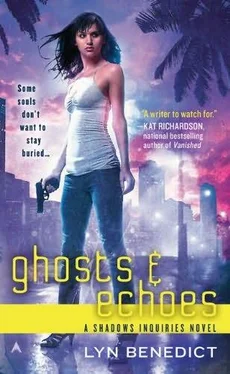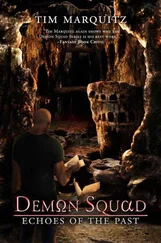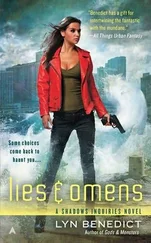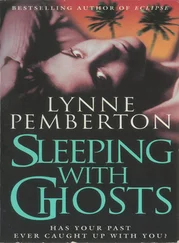“Was?”
Yeah, trust a cop to home right in on the point.
“He died. We tangled with some would-be sorcerers, and he got killed.” It cost her something still to winnow Rafi to cold fact and report his death in a level tone.
“They blame you,” Wright said. “ ’Cause grief makes people crazy. I get that. So our arresting officer?”
“First cousin, Felipe Suarez,” Sylvie said. “And if it hadn’t been him, it could have been one of Rafi’s brothers, his uncle, his sister, or his father. They’re a big family, and they bleed blue. So, they lose my permits and give me the runaround. We’ll sit, they’ll yell at me, maybe fine me. Depends on how bad their day went.”
“Lightner!” A big-voiced man in a rumpled suit poked his head into the hall, saw her cuffed, and sighed. He scrubbed at his face, stubble dark along his jaw, eyes weary. The very picture of a tired man about to go off shift and finding that he had one last unwelcome task to complete.
He disconnected her from the seat, the jangle of hand-cuffs, and pointed her down the hall. “You know the way.”
She wiggled her fingers bye-bye at Wright and let Detective Adelio Suarez lead her into one of the interrogation rooms.
* * *
THE ROOM WAS A FLUORESCENT HELL: CHEAP LINOLEUM, CHEAP paint, cheap video camera aimed squarely at the table bolted to the floor, all of it reflecting the flicker-shine of the false light. A rectangular window high up, filled with wire-mesh glass, showed a sky going blue and bright outside.
Here we go again, she thought, stiffening her spine. It was hard: With all the other Suarezes, she felt equal portions irritation and patience. With Adelio Suarez—she just felt guilt. Rafael had been his son, and when Rafi had come to work for her, she’d told Adelio she’d keep him safe. He’d been pleased. One child out of the line of fire.
He stabbed his thumb at the chair. “Sit.”
Disobedience ran deep in her soul, but she dropped into the wooden chair, heard it screek against the faded turquoise linoleum as she shifted her weight. The sooner she shut up, the sooner she’d be out of here. He paced behind her; then, just when she was preparing to start the game by asking for a phone call, he said, “Wait here,” and left the room. A total change of pattern. It made her wary.
Adelio came back with a file folder, and her gun, which he set on the table before her. It drew her eyes like a magnet; she missed his first words, lost in the itch to reclaim what was hers.
“. . . even with your testimony and Ms. Figueroa-Smith’s, we’ve had no luck finding the cultists that killed my son. We’ve got a set of probable names, but the suspects themselves are gone. All of them vanish on the same night, except for one of them, who disappeared some days earlier—a college student named Mira Castellan. She vanished from the UM campus, and funny thing is, Shadows, campus security recalls seeing your truck on that day. You’re no student.” He flipped through the folder, showed Sylvie a picture of the woman. Sylvie felt her upper lip curl, restrained any other response. Murderess.
“Campus is open to community,” she said. She traced a chip in the table’s laminate, pried at the edge of it with her fingernail. There wasn’t any point in denying her presence there. Her truck was noticeable, had been ever since the dire hound—her very first monster—had clawed six long furrows through the red paint to expose the metal beneath.
“These are the people who killed my boy, right?”
“You’re the detective,” she said.
“What happened to them?” Suarez said, his voice strung tight. “Did they run from you? Where are they, Shadows?”
Sylvie sank back in the seat, folded her arms. “I wish I could tell you.”
Yeah, this was a change of routine, and an unpleasant one. She wondered how the hell he had gotten the cultists’ names when she hadn’t been able to.
Hadn’t needed to. The god of Justice had done her scutwork.
While Adelio Suarez didn’t have preternatural help, Sylvie should have realized that grief, determination, and the resources of an entire police department were enough. Look what she managed with attitude and a gun.
He pressed his chair back to two legs, stared at the ceiling for a long moment, and dropped it down again with a thunk that made the table vibrate. “You wish you could tell me?”
“I don’t have any answers,” Sylvie said. “Does that make it clearer?” She stared him down; after werewolves, succubi, and gods, one overworked night-shift detective was barely a blip on her radar.
He dropped his gaze. “Tell me this one thing, Shadows, one thing. Do you think they’ll ever resurface?”
Sylvie grimaced. Maybe if he hadn’t been asking her in the middle of a police station, maybe then she’d be tempted to give him the answer he expected.
“Look, Lio, I’m sorry about Rafi—you know I am—but I don’t have any answers for you. And that’s a client of mine you’ve got cuffed out there. He’s got nothing to do with anything.”
“They never do; you take them down with you, anyway.” Suarez stood, turned away, facing the door. His shoulders slumped.
Sylvie was grateful for his weakness. It hid her own, the quick tears that burned her throat and filled her eyes. He was right, of course. Demalion was only the most recent, most graphic example of that. The Furies had shredded him down to his soul for doing what she had asked him to do. She reached out blindly, put her hand on the gun, finding familiar, cold comfort.
“Can I go?” she said.
“When you answer one question more for me,” he said. His voice was ragged, as if he’d been fighting to control his breath.
Sylvie groaned, put her head on the table, smelled greasy laminate and the lingering scent of gun oil. “I should have stayed at the beach.”
“Explain to me why you and your client were passed out at a crime scene. Or did you not know the Bayside Mall was the latest in a string of robberies?” Suarez leaned over the table, forced her to look at him. The sunlight creeping through the barred window was unkind to him, pointed out the fatigue tint to his skin, the silver in his stubble, and blanked those remarkable eyes.
“Motherfucker,” Sylvie muttered, the heels of her hands pressed tight to her forehead. “That’s why I was there. To prevent it or find out who was doing it.”
“Your Chicago beat cop hired you to worry about south Florida robberies?”
“Ever heard of multitasking?” Sylvie said. “He’s not my only client. Just the most needy.”
“The robbery?”
Sylvie shook her head. “I didn’t get a good look.”
He waited, leaning pointedly against the hallway door. She growled, but forked over her list of the car plates, the long one with all the cars in the lot, and the new additions nicely circled for him. She felt like she was back in high school, handing homework over to a bully. Except, of course, she had never been the bullies’ target.
He folded the paper into his hand, expression still somber. “Anything else?”
“I gave you my leads. You give me nothing. I think we’re more than done. I think you owe me one.”
“There was graffiti this time,” he said, as she pushed away from the table.
“Graffiti’s nothing compared to a list of getaway vehicles,” she said.
“So you don’t want to know what it said?”
Her hand was on the doorknob. She wanted out, but the case, her clients . . . “Something really interesting, I hope.”
“One word. Glory. On the glass of the sporting goods store. Nothing elaborate, a rush job. Just the word. You get anything from that?”
Читать дальше












